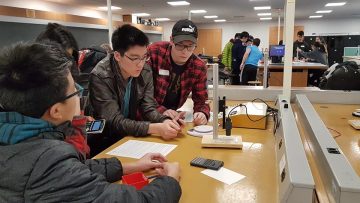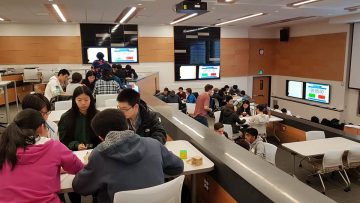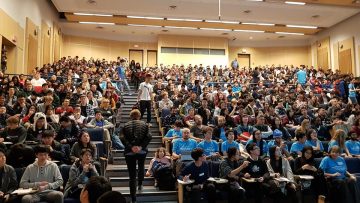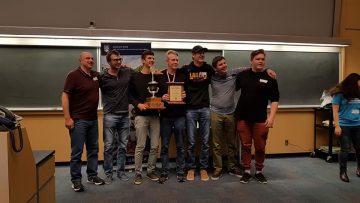By domansky
Huffington Post
By: Daniel Tencer
March 12, 2018

Huffington Post reported that UBC has several top-ranked programs in the world, according to higher education analysts Quacquarelli Symonds.
UBC has three programs that rank in the top 10: geography, library and information management, and sports-related subjects, which includes the School of Kinesiology.
Link to full text.
Story via UBC News.
By domansky
Xinhua
March 11, 2018

Xinhua highlighted the 40th annual Physics Olympics that took place at UBC over the weekend.
More than 700 high school students and teachers from across B.C. competed in the event.
Link to full text.
Story via UBC News.
By domansky

Studying is hard work. Make it easier and enter alumniUBC’s Cram for Exams Tuition Contest to win $2,500 towards tuition. Open to all currently registered UBC students!
Find out more
By domansky

March 13, 2018
The History Education Network (Dr. Penney Clark, Director) and the Historical Thinking Project (Dr. Peter Seixas, Director) were featured in a new report from the Conference Board of Canada, Making the Connection: Growing Collegiality and Collaboration Between K-12 and PSE Educators. The two networks together served as one of three case studies used to examine connections between the K-12 and post-secondary education sectors.
Read the report
By domansky

The World Association of Lesson Studies (WALS) International Conference 2018 will be held November 23-26, 2018 at Beijing Normal University, China’s leading higher institution for educational studies and teacher education.
The theme of the WALS 2018 is Lesson Study and Teacher Education: International Dialogue. It aims to provide a platform for an international and cross-cultural dialogue through which educators and researchers from different parts of the world can contribute to a broad vision for sharing their knowledge, understanding and experience of lesson study as a form of practice-based research.
Call for Paper and Session Submissions
The portal for paper and session submissions is now open. Deadline for submissions: June 30, 2018.
Please review the Call for Submissions PDF that contains important information about this year’s Annual Conference theme and submission requirements.
Read more
By domansky

March 13, 2018
The Department of Language and Literacy Education is pleased to announce the appointment of Dr. Ryan Deschambault to a tenure-track position in Educational Leadership and the promotion of Dr. Reginald D’Silva to the position of Senior Lecturer with tenure.
Congratulations to you both!
Read more
By domansky

We Teach Languages
By: Stacey Margarita Johnson
March 9, 2018
In episode 43 of the We Teach Languages podcast, host Stacey Margarita Johnson asks Dr. Ryuko Kubota, a professor of language and literacy education at the University of British Colombia in Vancouver, Canada, about a recent publication in which she explores ten common misconceptions in English language teaching (ELT). Ryuko talks about several of those misconceptions, including how beliefs about native speakers, whiteness, and legitimate forms of language contribute to the general public’s understanding of who is a good language teacher. Although this interview centers on ELT, teachers of all languages will find points of relevance to their own work.
Listen to the podcast here.
You can also listen on iTunes or the Apple podcast app: here.
By domansky

March 12, 2018
The Faculty of Education is pleased to congratulate two Education alumni on being nominated for the 2018 YWCA Women of Distinction Awards in the category of Education, Training & Development:
- Rosalind Poon (BSc 1999, BEd (Sec) 2000, Dip Ed 2006, MEd 2010), and
- Colleen Vaughan (BComm 1991, MEd 1998)
Recognized nationally, the YWCA Women of Distinction Awards honours individuals and organizations whose outstanding activities and achievements contribute to the well-being and future of our community.
Winners will be announced at the 35th annual YWCA Women of Distinction Awards ceremony to be held at the JW Marriott Parq Vancouver on Thursday, June 7, 2018.
Rosalind Poon (BSc 1999, BEd (Sec) 2000, Dip Ed 2006, MEd 2010)

As a Teacher Consultant for Richmond School District, Rosalind is leading ground-breaking initiatives in the areas of Science, Environmental Sustainability, Literacy, Assessment and Mentorship. She has been key in the development of ground breaking concept-based, competency-driven Grades 10-12 Science curriculum and worked with a multi-district team to develop Performance Standards for the implementation of the K-9 Science curriculum. Rosalind led the redesign and implementation of the District’s Environmental Stewardship Policy through the creation of new structures and programs. She established a new district network focusing on inquiry processes to enhance student learning and has been part of the provincial Adolescent Literacy Network, supporting multi-district collaborative learning around literacy and assessment. Rosalind has received awards from the City of Richmond and the Richmond Board of Education for empowering students and educators.
Colleen Vaughan (BComm 1991, MEd 1998)

Colleen, Vice-President, Academic at the Justice Institute of BC (JIBC), played a critical role in the development of Canada’s first interdisciplinary undergraduate degree in JIBC’s Bachelor of Emergency and Security Management Studies. She was instrumental in establishing JIBC’s innovative relationship with the Aga Khan Development Network, contextualizing and adapting curriculum for learners in south and central Asia. Colleen was JIBC’s champion for the Rural Disaster Resiliency Planning and Aboriginal Disaster Resiliency Planning projects. These applied research projects led to the creation of web-based tools and community education materials to help improve the disaster resiliency of rural, remote and Indigenous communities. Her numerous volunteer and community activities include serving on the board for the Emergency Social Services Association and being a representative at the 2017 Global Platform for Disaster Risk Reduction.
Read more
By eric lee
March 6th, 2018

Connect-to-Canvas transition in our Faculty has been ongoing as planned. There are about 100 sections migrated for January 2018 and about 70 for summer, but we can do more! UBC IT has created all Canvas course shells for Summer 2018. This gives us the opportunity to offer, in Canvas, all Faculty of Education courses (except for those taught in the Teacher Education Program) this summer.
If you will be teaching a course in the Summer (and it is not a part of the Teacher Education Program), you can begin working on it in Canvas. Visit canvas.ubc.ca to log in to Canvas.
If this will be your first time teaching in Canvas, Educational Technology Support (ETS) will be offering Canvas training sessions in the beginning of April. Stay tuned for more information on our website.
Feel free to contact ETS by email at ets.educ@ubc.ca or by phone at 604-822-6333 if you have any questions.
Read more

















